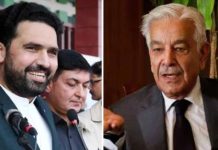Tunis, Oct 6 (AFP/APP):Tunisians voted Sunday in a presidential election largely expected to see incumbent Kais Saied secure another five years in office while his main critics — including one contender — are behind bars.
Three years after Saied staged a sweeping power grab, the election is seen as a closing chapter in Tunisia’s short-lived experiment with democracy.
After ousting longtime dictator Zine El Abidine Ben Ali in 2011, Tunisia prided itself for more than a decade on being the birthplace of the Arab Spring uprisings against dictatorship.
The ISIE electoral board has said about 9.7 million people were expected to turn out. About 47 percent of them are aged between 36 and 60.
At one polling station in central Tunis, a group of mostly older men were seen queueing up to vote.
“I came to support Kais Saied,” 69-year-old Nouri Masmoudi said. “My whole family is going to vote for him.”
Fadhila, 66, said she voted “in response to those who called for a boycott”.
The station had seen “a good influx of voters”, mostly over 40 years of age, its director Noureddine Jouini said, with 200 voters in the first half hour of polling.
An hour into the vote, Farouk Bouasker, head of ISIE, said the board had seen a “considerable attendance” of voters.
– ‘Respectable number’ –
In another station in the capital, Hosni Abidi, 40, said he feared electoral fraud.
“I don’t want people to choose for me,” he said. “I want to check the box for my candidate myself.”
In Bab Jedid, a working-class neighbourhood, there were fewer voters, and most were elderly men.
Saied cast his vote alongside his wife in the affluent Ennasr neighbourhood, north of Tunis, in the morning.
That station then saw a “very respectable number” of voters, its head Aycha Zidi said.
After rising to power in a landslide in 2019, Saied led a sweeping power grab that saw him rewrite the constitution.
A burgeoning crackdown on dissent ensued, and a number of Saied’s critics across the political spectrum were jailed, sparking criticism both at home and abroad.
New York-based Human Rights Watch has said more than “170 people are detained in Tunisia on political grounds or for exercising their fundamental rights”.
Jailed opposition figures include Rached Ghannouchi, head of the Islamist-inspired opposition party Ennahdha, which dominated political life after the revolution.
Also detained is Abir Moussi, head of the Free Destourian Party, which critics accuse of wanting to bring back the regime that was ousted in 2011.

















